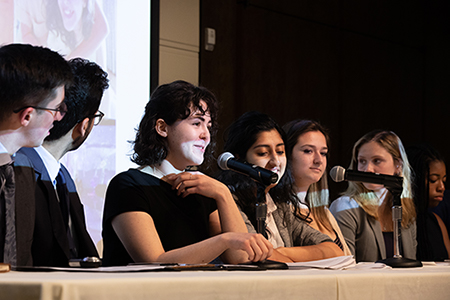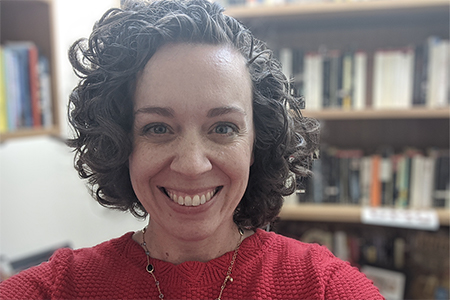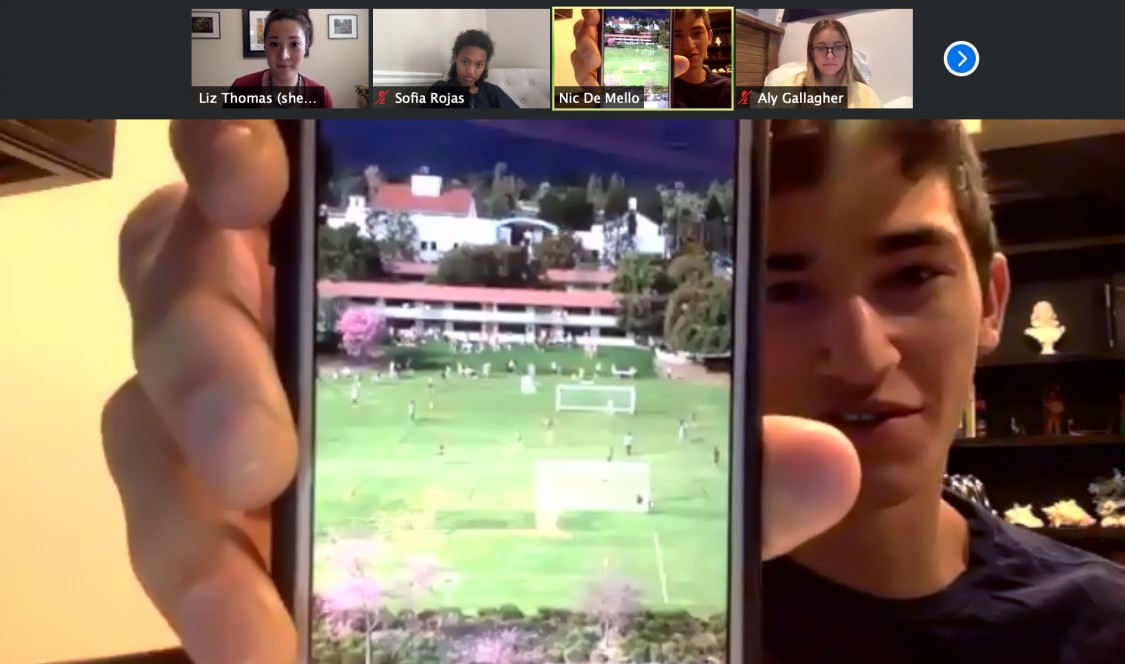By early February, Christine Crockett ’01 could read the writing on the wall. From Italy to Hong Kong, her global network of writing center colleagues reported massive disruptions at their campuses.
With the 2020 Appel Fellowship deadline looming, Crockett, who heads up CMC’s Center for Writing and Public Discourse (CWPD), started to re-imagine how a freshman summer travel-based writing experience could adapt to a world under quarantine.
She fleshed out an idea she had been toying with since before the lockdown: a daylong writers retreat.
Pre-pandemic, the Appel Fellowship program had included a few informational mixers and meetings, but no structured pre-trip learning. Writing support came as needed from each fellow’s faculty advisor and Crockett’s team of CWPD consultants.
Here was an opportunity to improve on that model, only instead of attending a daylong retreat, Appel fellows could experience a summer-long writing seminar.
In March, as the prospect of summer travel dimmed, she asked the 25 newly selected Appels to draft Plan B (limited travel) and Plan C (no travel) alternatives to their original project proposals. They would also have to decide how much of their travel funds to spend now, and how much to save for possible 2021 travels. (Each fellow receives up to $3,500 for domestic travel or $5,000 for international travel.)
“The thing I love about this new model” said Crockett, “is it promotes a very healthy attitude about knowledge and about writing: the idea that our students aren’t ‘done’ as writers or with a piece of writing once they ‘turn it in.’ These works can have lives beyond the classroom or submission deadline if only our students avail themselves of the opportunity to return to them.”
A Gathering of Wordsmiths
With founder Joel Appel’s blessing, Crockett reached out to alumni who are award-winning authors and digital media creatives. Guest instructors cheerfully stepped up, and in no time Crockett had assembled a robust eight-week writing seminar.
When Crockett contacted colleagues at the Soll Center and CMC Dean of Faculty Peter Uvin, they greenlighted her solution instantly.
That couldn’t have happened anywhere but a small liberal arts college, notes Crockett, whose prior experience includes writing programs at a community college and a tier-one research university.
“Here we have faculty who can stretch and be flexible alongside our students. Our faculty encourage our students to engage in academic travel, if you will. At a liberal arts institution like CMC, students are expected to explore different disciplines. That’s the beating heart of our campus,” she said.
Though it doesn’t carry course credit, the seminar—which ends in late July—covers a lot of ground. Each week a different guest speaker leads three or four hour-long workshops, supplemented with assigned readings, writing drills, breakout sessions and one-on-one consults.
The speaker roster includes short-fiction writers Corinna Vallianatos and Kevin Moffett; journalist and literary editor Yi Shun Lai ’96, novelist Camille Griep ’99, outdoors writer Elizabeth Thomas ’07, filmmaker Nausheen Dadabhoy and digital media storyteller Lori Kozlowski ’99.
Crockett drew on in-house talent, too. Three-time Pushcart Prize-nominated poet Chloe Martinez happens to be the CWPD program coordinator. CMC librarians Megan Donnelly and Kirsten Hansen contributed sessions on digital research and information literacy.
The writing seminar also allows Crockett to address students’ yearning for greater communal connection. This year’s fellows, even as they shelter at home across several continents, are communing like never before.
Alyssa Gallagher ’23 and Alex Albrecht ’23 have decided to team up. Both are outdoor enthusiasts. But while Gallagher’s original Appel proposal had involved journaling as she summitted Mont Blanc, Albrecht’s intention was to compose verses about the sublime while hiking the Pacific Northwest in solitude. Later this summer, he’ll camp in Olympic National Park, and she’ll climb in the Rockies. But next summer, they hope to ascend Mont Blanc together.
A certain maturity and nimbleness have always been required of Appels.
The fellowships, according to Crockett, “are meant to catapult students into new and unfamiliar situations that will challenge them and help them grow as human beings and as writers. But now it’s more personal. They’ll have a chance through the rest of this year to travel, but their projects will sit with them. They’ll keep working on them in ways they haven’t been encouraged to in the past. I think that’s a good thing that’s coming out of this difficult moment.”
Writers’ Boot Camp
In a Zoom session in late June, award-winning outdoor writer Liz Thomas is teaching the Appel fellows lessons in resilience. She has asked them to compose a letter to themselves, to be read at some future date when they’re feeling deflated—“like you’ve hit a wall.”
Over four workshop sessions, Thomas has challenged the Appels with “free-write” drills. She asked them to “name your inner critic and give it a shape.” She had them compose pithy tweets.
Sofia Rojas, who is sheltering at home in Northern Virginia, wrote this one:
“Just made a playlist for the trip I was supposed to take. Guess I’ll listen to it while making my makeshift Scripps brunch.”
“I think that’s really great,” Thomas commented. “In those two sentences, you were able to really express this idea of loss.”
Composing under a 280-character constraint “really forces you to think quickly and very artistically about what you’re trying to say and how to make it have the most impact” Liz reminds the group.
Thomas is both a professional hiker and an award-winning author, whose Long Trails won the 2017 National Outdoor Book Award for best instructional book. Current editor-in-chief at Treeline Review, she recently published her second guidebook, Hiking Waterfalls: Southern California.
A pair of photos by Nic De Mello earned her admiration. She challenged the students to use Instagram posts to paint a thousand words. De Mello chose two iPhone pictures of Green Beach, snapped on consecutive days on March.
“This is the Wednesday we found out that the rest of the semester would be canceled,” said De Mello, who lives in Geneva, Switzerland, but is sheltering in San Francisco during the pandemic. “We had a big party on Green Beach. This is the next day,” he added, sharing his snapshot of an empty field on a dull rainy day.
Thomas explained why the juxtaposition works.
“Green Beach isn’t that interesting. On any other day, who cares? But in the context of this party, because everybody has to leave campus, it’s very powerful,” she said.
Silver Linings
After Thursday’s workshop wrapped up, Thomas met with Alyssa Gallagher for a private consult.
Denied the chance to summit Mont Blanc, she had settled on climbing all the “14ers” within an hour drive of her home in Boulder, Colorado, with an eye toward penning a parents’ guide for child-friendly climbs. But the pandemic and world events have given her writing project a new focus. She now wants to know why people of color have so little involvement in the outdoor recreation space. Her end-product will be a proposal she’ll distribute to outdoor equipment makers and guide outfits suggesting ways to diversify their client base.
Thomas, who is a professional hiker with more than 20,000 miles under her belt, has lots of leads. She refers Gallagher to two seminal books on the subject and the resource-rich websites of an annual conference and a consulting group specializing in diversity in the outdoor space. She offers to introduce Gallagher to a writer in Alaska with similar interests.
“I would love to talk to that person,” Gallagher said, excitedly. “And would you mind if we have another meeting in about two weeks? I’ll have more questions then.”
Thomas agrees to the follow-up meeting.
With all the hardships brought on by the pandemic, there’s clearly a wide silver lining for these curious, resilient 2020 Appels.
-Diane Krieger

Panel discussion with 2019 Appel Fellows
Bites from Last Year’s Crop
One of the last gatherings at the Marian Miner Cook Athenaeum before the pandemic brought campus life to a standstill was a panel discussion with the 2019 Appel Fellows. The March 3 event spotlighted nine students who had traveled and written about their transformative experiences the summer before in 2019. A similar Ath event in the fall had featured 11 other fellows from the same cohort.
Now, as a new crop of Appels pursue their literary journeys under onerous travel restrictions and social distancing constraints, it is poignant – and instructive — to reflect on how the program has adapted to the changing times.
Last summer, T.J. Askew ’22 walked in the shadow of extreme wilderness trekker Chris McCandless, whose brief life and solitary death were chronicled in Jon Krakauer’s 1996 bestseller, Into the Wild.
A passionate outdoorsman, Askew, then a first-year student at CMC, was testing his own limits. He spent his childhood exploring the rainforest of Papua New Guinea, where his missionary dad was translating the bible into a tribal language spoken by fewer than 200 people. His mom, a nurse, ran the only clinic within 200 miles.
When the family returned to the U.S., Askew embraced backpacking and McCandless’ minimalist philosophy. “Leaving civilization to find himself really connected with me. I wanted to retrace his steps,” says the environment, economics, and politics major from San Diego.
So last July, Askew hiked 300 miles of the Pacific Crest Trail. He kayaked the Colorado River. He trekked into the unforgiving Denali backcountry. And like McCandless, he kept a journal.
“I’ve been transformed so much by my experiences,” said Askew, now a rising junior and a 6’6” guard-forward on the Stags basketball team.
Askew spoke of his adventure—and the reflection it had inspired—at the March 3 panel event at the Ath.
His journey was made possible by an Appel Fellowship, named for philanthropist Joel Appel ’87, who was in the audience that night.
Administered by Christine Crockett ’01, director of CMC’s Center for Writing and Public Discourse, the fellowships catapult first-year students into new environments and challenges them to explore their inner landscapes through introspection and creative writing. Now in its fifth year, the program has grown from eight in the 2016 pilot year to a 2020 cohort of 25. Each student receives up to $3,500 for domestic travel or up to $5,000 for international travel.
The 2019 fellows—Crockett affectionately calls them “our Appels”—revealed a panorama of life-shaping experiences, often illustrated with slides and accompanied by oral excerpts.
- Robin Peterson ’22 read from verse she’d composed in Arabic and English, inspired by Syrian, Iraqi, and Sudanese refugees she’d befriended while teaching English in Amman, Jordan. “My students were doctors, lawyers, and professors,” said the government major from Boulder, Colorado.
- In a tandem reading, international relations major Alison Marouk-Coe ’22 and psychology major Shania Sharma ’22 illustrated how their joint travel-writing project probed the limits of cross-cultural empathy. They had journeyed together to New York and then Mumbai, embedding themselves in one another’s family lives—questioning everything with strict candor.
- CMS track and cross country athlete Kyril Van Schendel ’22 screened a trailer for his first-person short documentary filmed over the summer. The Brooklyn native spent 30 days training on elite, high-altitude trails in the Southwest. He lived on “a clean diet of rice, beans, and vegetables” and took time “for personal reflection on why I run.”
- Axel Ahdritz ’22read an excerpt from his poetry collection, “On Belonging,” in which he described a tearful woman he had encountered while working at a Jordanian refugee camp near the Syrian border. She’d lost her entire family in Homs. “The stories I collected humbled me immensely,” the history major said.
- Sobechukwu Uwajeh '22, of Chicago, compared her hometown’s Pilsen neighborhood and the Harlem area of uptown Manhattan, interviewing Latinx and African-American residents for a podcast on the ups and downs of gentrification in their communities.
- Marisa Mestichella '22,a government and economics major, spoke of her experiences with street performers in Nashville, New York, and Portland. Her encounters fueled a series of essays and biographies on three distinct “busker” landscapes.
- Raj Bhutoria ’22 spoke about his book project on “Bharat Mata” (Mother India). The government, economics, and computer science major from San Francisco described crisscrossing the Indian subcontinent “to better understand myself and my Indian heritage.” He read passages about three strangers he’d met in Dharavi, a notorious Mumbai slum. “I was told it was dangerous, unloving, and unsafe,” he said. “The people of Dharavi quickly proved this to be false.”
—Diane Krieger
Fighting Writers’ Block at CWPD

Christine Crockett
In addition to re-imagining the Appel Fellowship program, Crockett has been responsible for recalibrating the day-to-day operations of CWPD, which usually logs 1,000 student visits a semester. Crockett has been troubleshooting ways to make the online tutoring platform work better for students, and she has since recruited and thoroughly trained a new cadre of writing consultants—25 current undergraduates, ready to handle whatever the fall semester brings.

